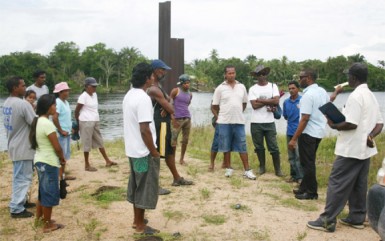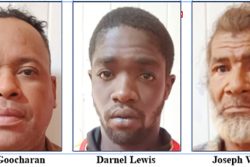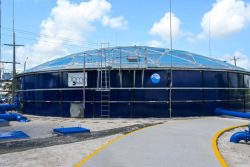A concerted effort is being made to dramatically increase food production in Region Ten.
Next Monday, Consultant Rawle Lucas, will meet farmers from four areas in Region Ten to explain a new structure of farm management that would be introduced in the region.
Regional Chairman Kwesi Sharma Solomon made the disclosure on Tuesday to about 15 farmers at Dalawala, a farming community located about two miles south of Christianburg on the west bank of the Upper Demerara River.
He said under the new paradigm, an attempt is being made to have farmers work in groups in their respective communities beginning with four pilot communities. Farmers’ groups drawn from West Watooka, Dalawala, Coomacka and Moblissa are being invited to attend the meeting, which will be held at the LEN Building, Republic Avenue, Linden. The intention is to ensure market-led farming and that farmers are paid promptly. It is however expected that they operate in a business-like manner.
Solomon said he met farmers last week in West Watooka and Tuesday’s meeting was the second of four meetings with farmers in the region. He intends to meet the Moblissa and Coomacka farmers later this week.
The Regional Chairman outlined that along with farmers in the respective communities being required to operate in groups the new approach will ensure that the groups are managed by a cooperative.
Highlighting the attempt to reintroduce the concept of clusters for farmers’ groups in Region Ten as an effort to establish a systematic way of producing food within the region, Solomon told the gathering that some of them would have a difficulty with accurately stating how much land they cultivate and how much they produce in a given period.

He said because farmers in Linden and Region Ten do not approach their vocation in a businesslike manner, they end up being among the poorest people in the nation. “Nowhere else in this country, you have farmers, who are not doing well,” he opined. “Even if they are not doing well it is not evident that they are not seeing a light at the end of the tunnel when it comes to farming.”
He also told the Dalawala farmers that although they farm in the same community should he ask each one of them what others are doing with respect to farming they would be unable to tell him. He added that it is that lack of knowledge, which prohibits them from collectively meeting a substantial portion of the region’s food demand. “You don’t even know what is coming out of Dalawala,” Solomon emphasised. “Dalawala does not know its true potential and what its market needs are. So, everybody just growing anything that you feel is good to grow and what you want to grow and not necessarily what the market needs.”
Collective work
Encouraging the Dalawala farmers to form themselves into a group of about five to ten farmers and to give the group a name, Solomon said the West Watooka farmers had chosen the name: Green Leaf Farm Produce, which comprises 12 to 15 farmers.
He said that while a lot of farmers in Linden do not know how much they collectively produce or the market needs, 18 trucks enter Linden daily from other communities with about 1,500 to 2,000 pounds of food.
“We know there are 118 vendors who sell greens… 85 of them bring in food every other day, which comes up to another 30,000 pounds of food,” he said. “Dalawala doesn’t know how much food it produces and not only that, it does not know what foods it produces. So, you don’t even know how to meet the market needs– and that’s how we’ve been farming all the time, just trying to get through and get by.”
He surmised that because farmers at Dalawala are not properly structured, they do not get effective representation. “The people in West Watooka, the Green Leaf Company that is going to start up, that will have a cooperative managing it for them is intended to make farmers do what farmers do best – farming. Farmers should not fight up themselves with finding loans, markets, transportation and resources to clear creeks,” Solomon stressed. “Leave that to the people, who are managing your farming entities ….”
Reiterating that the new approach is intended for Region Ten farmers to produce more food for the region that would decrease the dependence on food from outside the region, Solomon said within the next two weeks the Greenleaf Farmers will set up a market day once a week at Amelia’s Ward.
Available markets
He pointed out that Region Ten farmers and vendors not only have a lucrative local market for which they have to compete daily with trucks that come from outside the region but there is also the potential market of at least 25,000 people who bypass Region Ten to purchase food in Georgetown and other coastal areas to take back to the interior. The Regional Chairman also noted that should Region Ten farmers step up production, they could also access the wider national, Caribbean and international markets.
One Dalawala farmer, who cultivates about seven acres, said the farmers in his community are nervous about the current rainy season because they fear flooding. He said the government recently received about 40 excavators from the Japanese Government but none has been deployed to Linden.
The Regional Chairman said that $15 million has been set aside for Dalawala in the 2013 national budget. He said after a similar meeting last year at Dalawala, the Regional Democratic Council was able to get the government to allocate $3 million towards cleaning the three main creeks at Dalawala. “So, those creeks are going to be dealt with – cleaning and clearing those creeks,” Solomon said.






